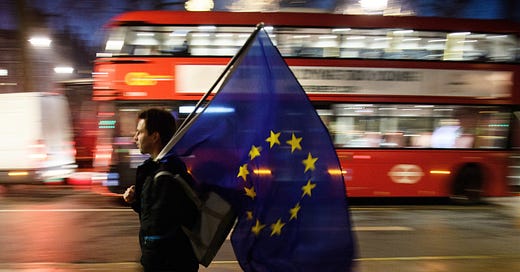Remember Brexit?
The U.K. and the EU could be headed for a crash just as their economies can least afford it.

In the midst of the COVID-19 pandemic, the British can be forgiven for having forgotten about Brexit. But Brexit has not forgotten about them.
With the clock ticking down to December 31, the scheduled end of the one-year Brexit transition period, there is a real risk that the U.K. could crash out of Europe without a trade deal. It hardly needs emphasizing that, as bad as the economic shock of a crash-out would be in normal circumstances, it would be substantially worse amid a major economic slump caused by a pandemic.
To say that the U.K. government has mishandled the pandemic would be a gross understatement. In addition to suffering Europe’s highest number of COVID-19 mortalities, the U.K. economy is faring considerably worse than those on the Continent. According to the OECD, the British economy could contract by as much as 14 percent in 2020. That would be the country’s worst single-year economic performance in the past three centuries.
This time last year, Prime Minister Boris Johnson’s government was threatening to lead the U.K. toward a hard-Brexit. In the event, Parliament forced Johnson to request a one-year transitional period from his European partners to give more time for the negotiation of a final deal. The granting of that request staved off, at least for another year, the potential disruption in trade relations with the European Single Market, which is by far the U.K.’s largest export market.
Under the terms of the Brexit transitional arrangement, the British government had until June 30 to request from Europe an extension in the transition arrangement beyond December 31. Pandering to the hardliners within his Conservative party, Johnson ruled out any notion of his government making such a request. He did so knowing full well that Parliament would be unable to force his hand this time, thanks to the comfortable parliamentary majority his government secured in the December 2019 elections.
This all means that the U.K. once again faces the risk of crashing out of Europe at the end of this year. That risk could be averted if the U.K. were to come to terms with its European partners. It could also be averted if Johnson were to make the politically costly decision of backing down from his opposition to requesting an extension in the transitional arrangement and if the Europeans could somehow find a way to make that legally possible under the terms of the transition agreement.
One source of hope for the U.K. is that the Europeans know that their coronavirus-wracked economies are also in no position to absorb the shock of a disorderly U.K. departure. This might make them more amenable to dropping their red lines in the ongoing Brexit negotiations. It might also make them more receptive to finding a way to allow for an extension in the Brexit transition period if needed—assuming Johnson would ask for one.
Both the currently ailing U.K. and European economies desperately need Johnson to seize on the opportunity afforded to him by Europe’s weakened economic state to avoid a catastrophic U.K. crash-out of Europe. This might be his last opportunity to strike a fair final deal for his country. At least, the current slump might allow him to wrest from his European partners an extension in the transitional period. That would spare both the U.K. and Europe from the shock of a hard Brexit just when their economies are least able to absorb it.



